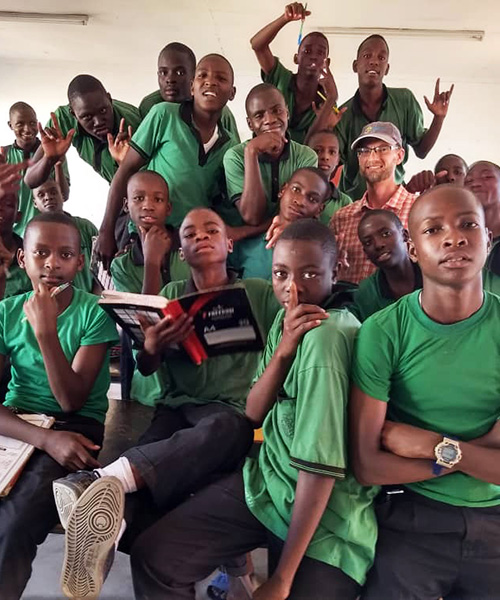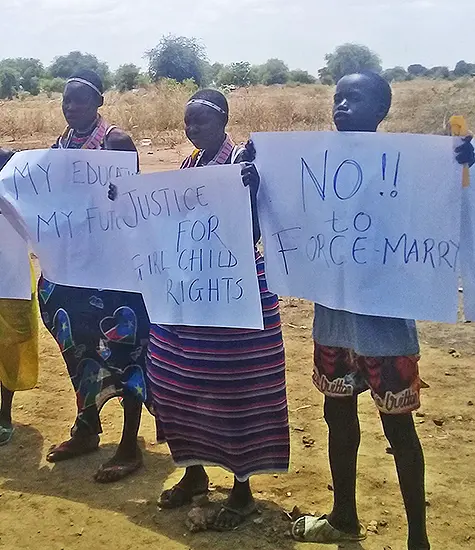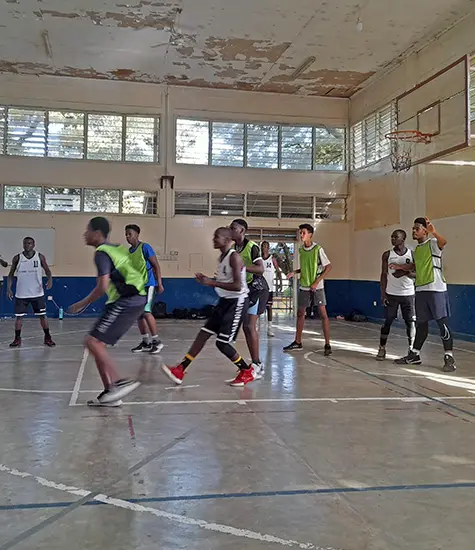Fall 2021 newsletter
Steve and Loyce Veryser, Tanzania

Our math class at Bwiru Boys Technical School in Mwanza.
July 13 was my first day of school, again. I stood at the front of a class of 22 deaf freshman boys at Bwiru Boys Technical School. We stared at each other. My memories of being a young Peace Corps teacher in the same school 17 years ago — with no formal training in education — blocked out all the Tanzanian Sign Language that I had learned over the past nine months. I smiled at them. They started to look at each other. Then I remembered how to sign “hi.” The metal legs of their chairs skidded on the rough cement floor as they stood up to greet me, “Good afternoon.” They smiled at me. I could do this, again.
They had already been at high school for half of a year. The school year starts in January in Tanzania. In their regular classes, they had probably covered half of the freshman year curriculum — and would continue the curriculum in the regular classes, where they were mixed with hearing students and taught by a teacher who doesn’t sign. I figured I would start at the beginning of the book, and if they already understood the concepts, move through lessons quickly.
I drew three lines to divide the board into four spaces and wrote the date in the upper right corner of the uneven blackboard. I remembered how dusty the cheap chalk is here and was grateful for the protection of the COVID mask from the dust. I suppressed an inclination to ask myself if I hadn’t wasted the last decade and a half of my life if it had only landed me “back where I started.” But actually, it felt good to be back in class, sharing my knowledge with young people, and now with students that needed the extra help even more.
I wrote 1,056,237 on the board and invited a volunteer to write and spell it out in English. As he struggled with the place values (what goes between “one million” and “fifty-six thousand”??), he looked over his shoulder at the hints the other students were signing to him; he got through most of it. He handed the piece of chalk back to me, and I realized it was my turn to be tested. Could I remember how to sign all the place values to review the correct English of the number spelled out? I pointed to each number, let the class show me the signs, and made slight corrections to the English that he had written (nothing goes between “one million” and “fifty-six thousand”😊).
We wrote out some more numbers together. The signs for a hundred, thousand and million came back to me. I realized that though they had covered the topics in regular class, almost none of them had understood. The beginning of the book turned out to be the right place to start. It was only now, after going through the concepts in sign, that they started to make sense. We reviewed types of numbers — even, odd, whole, integers, positive, negative, prime, multiples, factors, fractions.

Eligius Innocent explaining lines to the class in Tanzanian sign language.
At the end of the week, one of the students waved the class to attention. In sign, he thanked me for teaching them in sign. I thought of how grateful I could be for the last year, which had been so difficult for so many, and yet had been a year of learning and opportunity for me to serve in a different way. If it hadn’t been for the extra time — and for my friend Amani, who taught me to sign — my mission experience wouldn’t have taken this full-circle turn that put me back in this classroom.
Most students with disabilities come from resource-poor homes. I’m working with the school to ensure that those most in need have access to government health insurance coverage. Some don’t even have basic classroom supplies like notebooks or, since they’re in boarding, personal care items like soap and toothpaste.
If you’d like to help provide basic resources for these students, please donate by clicking on this button:










Thank you so much, Steve, for sharing this beautiful story. It’s inspiring to see your dedication to the students and to see the students enthusiasm for learning!